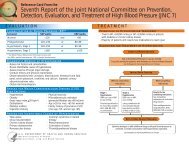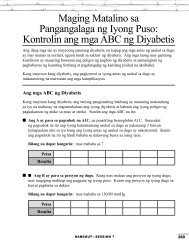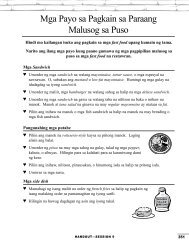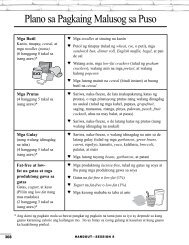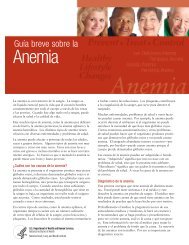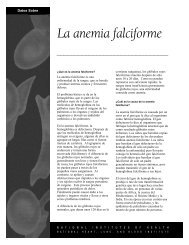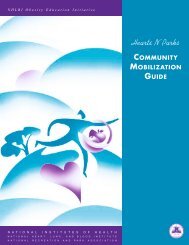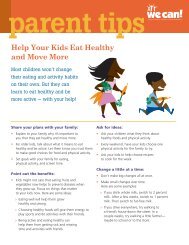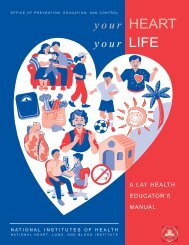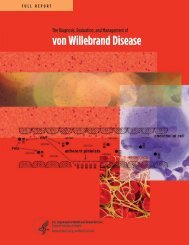WOMEN 'S HEALTH AND MENOPAUSE : - National Heart, Lung ...
WOMEN 'S HEALTH AND MENOPAUSE : - National Heart, Lung ...
WOMEN 'S HEALTH AND MENOPAUSE : - National Heart, Lung ...
Create successful ePaper yourself
Turn your PDF publications into a flip-book with our unique Google optimized e-Paper software.
Therefore, convincing evidence of treatment benefit<br />
requires a placebo-controlled clinical trial.<br />
Women may visit the physician because they have<br />
symptoms they suspect are related to menopause<br />
or because they want information about the<br />
menopause. In either case, assessment for symptoms<br />
provides an opportunity to discuss issues that<br />
might otherwise remain unaddressed.<br />
Symptoms directly or indirectly related to the<br />
menopause transition include:<br />
• Vasomotor symptoms (hot flushes and<br />
night sweats)<br />
• Sleep-related symptoms<br />
• Mood changes<br />
• Sexual dysfunction<br />
• Problems with concentration and memory<br />
• Urogenital symptoms<br />
Symptoms can be queried by using a questionnaire<br />
or symptom checklist during the interview. Some<br />
find that asking about sexual satisfaction is facilitated<br />
by the use of a checklist. When a checklist is<br />
used, it is important to go beyond the list to assess<br />
the severity and duration of<br />
It is important to have reported symptoms and the<br />
degree to which they inter-<br />
a dialogue with the<br />
fere with the woman’s life.<br />
patient. Failure to listen For example, hot flushes<br />
that are not bothersome<br />
and discuss may explain<br />
do not require treatment.<br />
why many women<br />
prescribed HRT do not<br />
fill the prescription.<br />
274<br />
When asking about<br />
symptoms, the clinician<br />
should be sensitive to<br />
each woman’s:<br />
• Beliefs and attitudes about menopause, including<br />
her medical vs. nonmedical treatment<br />
preferences, anxieties, and coping style<br />
• Sociocultural and ethnic background that may<br />
affect her concerns and choices<br />
• Work situation, job satisfaction, and stress<br />
• Other life stressors, particularly with personal<br />
relationships<br />
• Social supports<br />
• Overall quality of life<br />
• Current use of nonprescription herbal, nutriceutical<br />
(a nutritional supplement designed for a<br />
specific clinical purpose), or phytoestrogen<br />
remedies.<br />
It is important to have a dialogue with the patient.<br />
Failure to listen and discuss may explain why many<br />
women prescribed HRT do not fill the prescription.<br />
2.2 Symptom Prevention and Treatment.<br />
Vasomotor Symptoms: Hot Flushes and<br />
Night Sweats<br />
2.2.1 Lifestyle<br />
• Wear layered clothing that can be removed or<br />
added as necessary.<br />
• There is conflicting evidence as to whether<br />
exercise improves menopause vasomotor<br />
symptoms.<br />
2.2.2 Diet<br />
• Avoid hot spicy foods and beverages, and<br />
reduce caffeine.<br />
• Avoid alcohol beverages (excess can cause<br />
flushing).<br />
2.2.3 Pharmacotherapy<br />
• In a systematic review of more than 40 randomized<br />
controlled clinical trials, oral and transdermal<br />
estrogen each reduced the severity of vasomotor<br />
symptoms, and estrogen was effective in<br />
doses lower than the usual 0.625 mg of equine<br />
estrogens or equivalent.<br />
• Transdermal estradiol and intranasal<br />
17β-estradiol spray are as effective as oral<br />
estrogen in reducing hot flushes.



